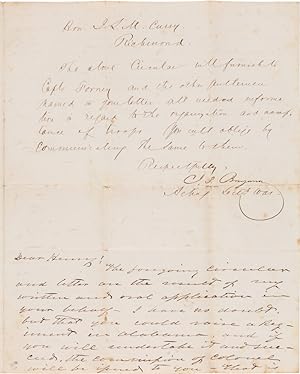About this Item
[2]pp. printed circular letter, plus [2]pp. of manuscript text on integral blank. All on a folded folio sheet. Old folds. Moderate soiling, minor splitting along some folds. Verso of both leaves reinforced with tape at cross-folds. Embossed stamp "Sic Semper Tyrannis, Virginia" on upper corner of first leaf. About very good. An interesting piece of correspondence between noteworthy Confederate leaders, consisting of two autograph letters, signed, written on the integral blank of a rare Confederate States War Department circular. The circular itself, which is tied to the correspondence, responds to questions concerning the terms of acceptance of troops into the Confederate Army. Printed in mid-November of 1861, it consists of seventeen numbered statements which describe how and when units will be accepted. Limits are placed on the acceptance of troops who are not already armed and equipped (particularly Cavalry and Artillery). Timelines of pay are described for soldiers and officers, and it is made clear that field officers are not promised commissions if their units are reorganized into Regiments or Battalions. The circular is signed in type by Judah P. Benjamin as Acting Secretary of War; this copy is actually dated by Benjamin in manuscript on November 21, the day he was confirmed in the permanent position. On the integral blank, Benjamin has written and signed a short autograph note to Alabama Representative Jabez Curry. It reads in full: "The above Circular will furnish to Capt. Forney and the other gentlemen named in your letter all needed information in regard to the requisition and acceptance of troops. You will oblige by communicating the same to them." Benjamin has actually signed the note as "Acting Sect'y War," which suggests that this may have been a bit of business he took care of the morning of the 21st, before he was confirmed. Below Benjamin's note, Curry has written his own, longer autograph letter to the aforementioned Captain [William Henry] Forney, also of Alabama. He tells Forney that "the foregoing circular and letter are the result of my written and oral application in your behalf. I have no doubt, but that you could raise a Regiment in Alabama, and if you will undertake it and succeed the commission of Colonel will be fixed to you." Curry also shares news of the war, writing with some trepidation that "It seems the Yankees are making a formidable devastation against us on the coast + Mississippi river. Their long and tedious preparations are beginning to exhibit themselves, and in a few days we are to have serious work." He goes on to discuss political matters with Forney, raising concerns about the recent elections for the First Confederate States Congress. He approves of both men elected from Alabama, but worries if either will be fit for duty: "[William Lowndes] Yancey and [Clement Clairborne] Clay have been elected Senators - good selections. Clay will be unable to attend to his duties, unless his health is greatly improved. Yancey may be captured [returning home from a diplomatic trip to England] & then we will be in a bad box." Yancey made it back to the Confederacy safely, but died suddenly of kidney disease in 1863. Clay, who appeared on the Confederate one-dollar note, was able to serve his whole term, and was later suspected of involvement with Lincoln's assassination. All three men involved in this correspondence were noteworthy figures in the South before, during, and after the War. Judah P. Benjamin was the first Jewish person to hold a Cabinet position in North America and the first to be elected to the United States Senate who had not renounced his faith. Though initially hesitant about the Southern cause, he was a talented lawyer and orator and became a vocal secessionist when the crisis loomed nearer. He was promptly appointed Attorney General by Jefferson Davis, became Secretary of War in November, and eventually Secretary of State not long after. After the fall of Richmond, Benjamin f. Seller Inventory # WRCAM62845
Contact seller
Report this item
![]()


